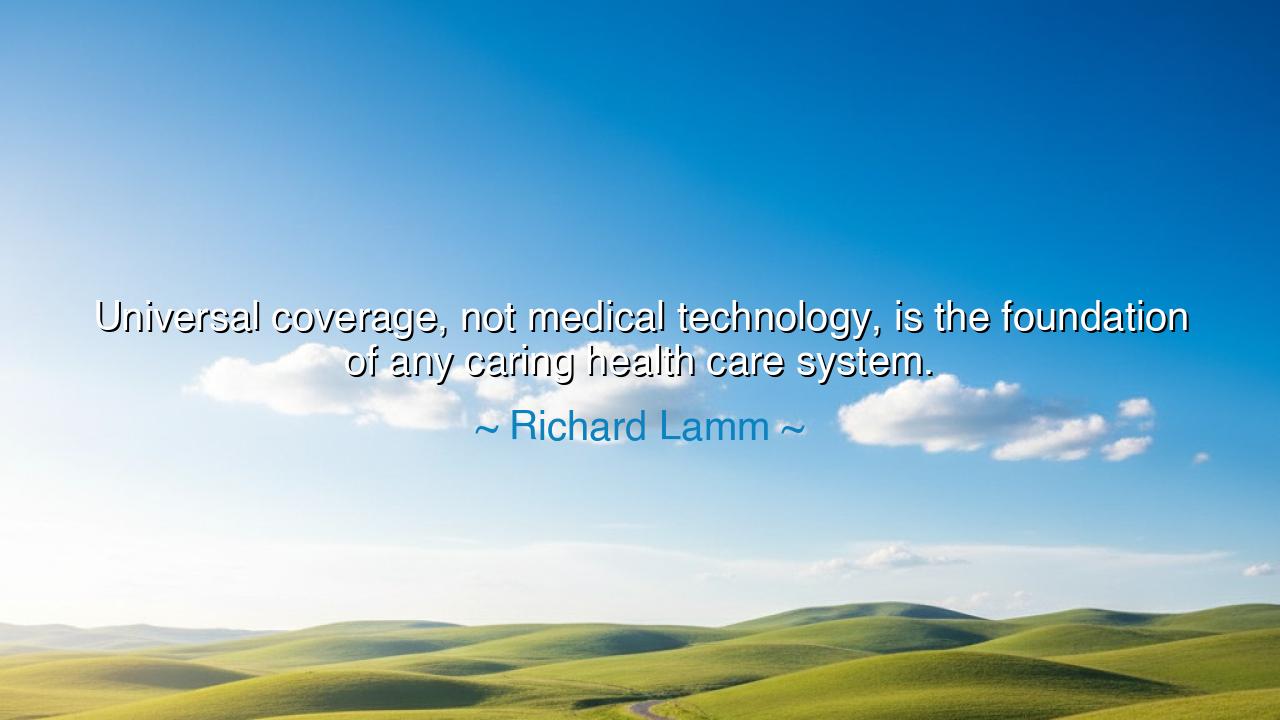
Universal coverage, not medical technology, is the foundation of
Universal coverage, not medical technology, is the foundation of any caring health care system.






“Universal coverage, not medical technology, is the foundation of any caring health care system.” — Richard Lamm
Listen, O seeker of truth and compassion, to the words of Richard Lamm, a statesman and thinker who gazed upon the proud towers of modern medicine and saw both their glory and their emptiness. In this saying, he separates what dazzles from what heals. He reminds us that the heart of a caring health care system is not in the brilliance of machines, nor the sophistication of medical technology, but in the embrace of universal coverage — the simple, ancient duty to care for one another. For what good are shining instruments and powerful drugs if they serve only a few, while the many are left in suffering? True healing, Lamm teaches, begins not in the laboratory, but in justice and compassion.
In the age of Lamm, and still in our own, the world has been seduced by the spectacle of progress. We marvel at the surgeon’s laser, the robot’s precision, the miracle of artificial hearts and genetic cures. Yet beneath the gleam of invention lies a shadow — a world where these wonders are reserved for those who can pay the price of access. The poor remain untreated, the weak unprotected, the weary unhealed. And so Lamm raises his voice like a prophet in the wilderness, crying out that the foundation of care must not be privilege but inclusion. The structure of medicine cannot stand upon the thin pillar of technology alone; it must be built upon the broad ground of human equality.
To understand his wisdom, look to the tale of the ancient healers, the shamans and physicians of early civilizations. They possessed no machines, no computers, no dazzling instruments. Yet they were bound by a sacred oath: to serve all who came to them, rich or poor, noble or beggar. The physician of ancient Greece did not ask first for gold, but for the patient’s trust. The village midwife did not choose which mother to aid. Their medicine was woven from the same fabric as compassion itself — the recognition that life has equal worth in every body. This is what Richard Lamm calls us back to: the ancient truth that care without equality is not care, but commerce.
He saw, as a public leader and governor, that nations boasting of progress often left their own people behind. In his homeland, where machines hummed and knowledge soared, he saw families bankrupt by illness, children denied treatment, elders dying alone. He understood that technology, wondrous as it may be, cannot fill the void where community should stand. A society that heals only those who can afford healing has forgotten its soul. Thus, he declared that universal coverage — the promise that no one shall be left to suffer alone — is the true test of a nation’s mercy.
Consider, too, the story of Sweden and Norway, whose people, after centuries of hardship, built systems of care that left none behind. Their hospitals are not temples for the wealthy, but sanctuaries for all. There, the sick are seen as citizens, not customers. Their progress is quiet, their technologies humble, yet their compassion vast. They have built not only hospitals, but a social covenant, where health is not a privilege but a right. It is this covenant that Lamm speaks of — the unspoken agreement among a people that to live together is to care together.
His words strike at the vanity of the modern age: we believe that invention alone can save us, but invention without compassion is a hollow triumph. A nation may build machines that can mend hearts, yet fail to open its own. Lamm’s wisdom is a call to remembrance — that before there were hospitals and wires and gleaming halls of science, there was the healer’s touch, the neighbor’s concern, the shared bowl of medicine in the village square. Universal coverage is not merely policy; it is the continuation of humanity’s oldest vow: “You shall not suffer alone.”
Therefore, let each one who hears this teaching take it to heart. Support systems that include all, not just the strong. Defend the right of every person to see a doctor, to heal, to live. Do not be dazzled by technology and forget tenderness; do not praise innovation and neglect compassion. Remember that true health care begins not with machines, but with mercy — not in the circuitry of devices, but in the circuitry of the human heart.
For the wisdom of Richard Lamm is eternal: a nation is only as healthy as its poorest citizen, and medicine is only as noble as the love that guides it. Let our future, then, be built not upon the sterile glow of machinery alone, but upon the warm, steady flame of universal compassion. For it is that light — shared by all, denied to none — that makes a people truly whole.






AAdministratorAdministrator
Welcome, honored guests. Please leave a comment, we will respond soon